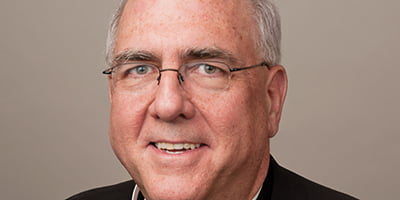
by Archbishop Joseph F. Naumann
From his prison cell in December 1944, German Jesuit Father Alfred Delp penned a meditation entitled “Figures of Advent.” He wrote about John the Baptist as a warning prophet, who shakes us from our complacency, calls us forth from the devastating effects of our sin and invites us to experience a conversion of heart.
Last week, I shared part of Father Delp’s reflection on what he termed “the announcing angels,” who herald a hope of something miraculous that God is beginning to do even in the midst of the most difficult circumstances.
Mary is the third and final figure of Father Delp’s Advent meditations and the one he calls most comforting. He wrote: “That the angel’s message found her heart ready, and the Word became flesh, and in the holy room of her motherly heart the earth grew far beyond its limitations into the human-divine sphere — these are the holiest comforts of Advent. What use to us are the thought and lived experience of our affliction, if no bridge is built to the other shore?” Jesus is the bridge, the God-man, who not only redeems us from our sin-fractured world, but offers us the opportunity for abundant life. In God’s mysterious plan, he made Mary’s “yes” to being the mother of Jesus a necessary condition for setting in motion the whole series of events that resulted in the great outpouring of
God’s mercy and love that culminated on Calvary.
I like to think that I am in control of my life. Most of my days are very tightly scheduled. I become irritated when I have to adjust my plans because weather or other events beyond my control interrupt my schedule.
What amazes me about Mary’s “fiat” to God’s plan for her was her ability to surrender, in a moment, so many of her own plans for her future. This could only be possible for someone who, through a well-developed prayer life, had made her heart so attentive and supple to God’s will.
Mary reminds us of what God can accomplish with a human heart that is waiting and open to be overshadowed with his love and power. Through the grace of our baptism, the Lord has given us the same ability to embrace his will in our lives as he gave to Mary through her Immaculate Conception. He wants to use us to be vessels of his grace and love in our world, just as he used the womb of Mary.
We live in a particularly impatient time. Waiting is something that our cul- ture teaches us to dislike and resent. We are used to being able to receive infor- mation and answers immediately. Drive-thru lanes and express lines are popular because they minimize our time of waiting.
As a result of the recent ice storm, I lost electrical power at my residence. My power was out for a little more than 12 hours, much less than what many in our region had to endure.
The archdiocesan offices were closed. My computer was dead. The television, microwave and the electric stove had all been rendered useless. I was frustrated and impatient for the power to be restored. I was disturbed by not being able to accomplish all the things that I planned that day.
At some point, I became resigned to my fate and I became aware that an opportunity was being offered to me. I realized the “power” was not off in my chapel. I realized that I was being forced to place the rest of my life on pause and given the chance to spend more time listening to God and simply adoring him. These hours turned out to be some of the best and most fruitful of the entire Advent season. For a few hours, I was forced to abandon all of my plans and to lose myself in God’s plans for me.
Hopefully, Advent has been a time for all of us to wait upon the Lord; a time when we have allowed God to expand the capacity of our hearts to receive him; a time to forget our own plans and become lost in God’s plan for us. I pray that as we conclude this special season of prayerful waiting, our hearts are better disposed to begin each day, not with our list of all the things we want to accomplish, but with the words of Mary’s response to Gabriel on our lips: “May it be done to me according to your word.”

